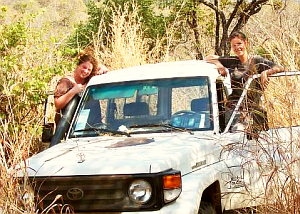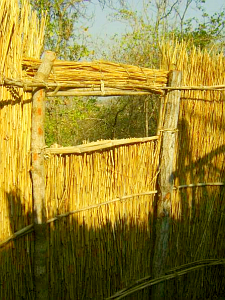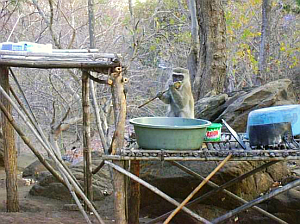Volunteer Report
Everyday Heros (by Sophie Brown, Sept. 2011)
The sun streamed through the window of my little mud house, just after 5.45 a.m. I could hear the gentle "peeping" of a hornbill, and chattering of starlings and I wondered what today would bring. Africa has a way of surprising you, no matter what you had planned!
I was up and out of bed and out to the "water pump rock" to brush my teeth with a fabulous view of the forest, before heading up to the top of camp, to help with breakfast. Blue and orange lizards (still need to identify them - I think they may be common flat lizards) lay out on rocks, warming their blood in the morning sunshine, to kick start their day. Lynn was already up and breakfast was well underway. Lynn's breakfasts have a reputation for setting you up for the day - eggs, toast and tomatoes, washed down with Malawian tea.
 |
|
Sophie and Morgan |
The view from the breakfast table at Thuma is amazing, and as the morning light changed with each passing minute the colours of the forest glowed in turn, and the morning mist slowly lifted from the tree canopy. An African Harrier Hawk was hunting in the trees in front of us, only his enormous wing span flitting through the trees gave him away, and the ominous silence from the other birds as they went into hiding. The resident Hyrax family, peeked out of their rocky home, ever hopeful that a small piece of toast might be spared; or even a tomato.
It was then time to get boots on, fill up water bottles, grab cameras and binoculars and meet up with the scouts to head out for a hike.
The walking around Thuma is beautiful, although the terrain and rising temperature is challenging. My advice to any other volunteers planning to come out, is to get as fit as possible before you arrive!
 |
|
Our new shower. With a view! |
Walking in line and in silence, we headed out, hoping to see Elephants, but delighted to see any wildlife on the way. On this particular morning we saw signs of hyena, a family of Warthogs, and the scouts pointed out a variety of foot prints and droppings, from porcupine to mongoose. Suddenly the scouts stood still. I had heard nothing other than our feet gently scrunching on the dry leaves under foot. Their well-trained ears had picked out Elephants - not far from where we were. This was signaled by a serious of clicking noises from the first scout in the line, in turn, all the way down to the last. Again we stood in silence. There was a whisper, "Njovu." (for my benefit!) Elephant. Hand signals from a few scouts all pointed towards the north. Oliver picked up some soil and threw it into the air, watching it fall away behind us, in the gentle breeze. We were downwind. In silence, flowing hand signals we looped around keeping downwind, until we were facing a sloping hillside covered in miombe trees. I stared and stared, Elephants are huge, why couldn't I see them? I couldn't hear them either. "Where?" I whispered in frustration... "There!" pointed Oliver;. It is amazing how these enormous mammals can just blend and disappear into the forest. After a few seconds focusing, I saw them. 2 females and a calf. We stood and watched. I was torn as to whether I should be clicking with the camera or just watching them, when suddenly the wind changed direction. Trunks went up, scenting the air, ears came out, and with an indignant trumpet they were off into thicker cover. It was my first truly wild elephant sighting, and I was on foot! Fantastic! On the way back, the scouts pointed out weaver bird nests, and native bird life. We arrived back at camp, after 3 and half hours, very,very hot, and thirsty. The bush shower was never so appealing! There is something about looking out over the forest while you shower, that is quite magical.
Over the next week or so, we worked with Lynn to start building id sheets for the local population, which is estimated to be around 200 individuals. We recorded groups, the number in the groups, and started to identify individuals within groups, by tusk size, colour and shape, as well as any other notable markings, such as scars or tears in the ear flaps. We even got to give a couple names!
In the evenings we would sit up on the top rock and watch the sun set over the forest. We would cook our super over an open fire, and listen to the rustles in the bush around us. As we drifted off to sleep at night we would hear Hyenas calling around us. They sounded close, but noise can travel quite far in the forest. We felt safe knowing that "Trevor" the Baboon Spider, was "on guard" every night outside our door. We became very fond of him.
I have never done "bush camp" living before, but I quickly adapted. Some lessons you learn the hard way - like don't leave food out in the kitchen, because Mr Greedy the resident Vervet monkey (quite a character) and his sidekick, "Piglet" regularly raid the kitchen, demolishing anything in sight, in seconds.... I have attached some pictures of Mr Greedy and Piglet, sharing my birthday cake mixture, when I had left the washing up out for more than 5 minutes! I gave up trying to keep my feet clean, and surrendered to the fact the dust gets everywhere!
 |
|
Mr. Greedy, our friendly monkey in camp |
We set up a motion camera outside the scouts camp, as Mr Blacks said a porcupine came round at night looking for food scraps. Sure enough, in the morning we uploaded the memory card to the lap top and saw that more than 1 porcupine came in the night over a period of 5 hours.
Both Morgan and I had birthdays while we were at camp, and Lynn arranged a brilliant party for us. It was a very memorable evening, spent with all the scouts and camp staff, (with a few drinks ;0)) sharing stories around a fire, and learning about different cultures, practicing a bit of local language, followed by some dancing, of course! I will never forget the image of 5 tough Malawian scouts dancing with us to Dolly Parton - 9 to 5.... Played from my ipod!
The next day it was back to work, serious work, as the scouts got themselves ready to go off on an overnight patrol. They were heading out towards Chilombo, hoping to catch some notorious poachers from that area. The Thuma scouts are so brave. Unarmed, their only communication with base camp is a mobile phone with intermittent reception. Arrests over the past year have increased, as funding has allowed more scouts to be employed. They are now able to patrol 25 consecutive days in the month and the results are really starting to show. Poachers come into the reserve for a variety of illegal activities, from deforestation - such as charcoal burning and collecting building materials to bush meat poaching, which is anything from setting snares, digging pit traps and shooting at animals with homemade guns and bullets. The work of the Thuma team is relentless. They are fearless and tireless for their cause. It is very humbling.
I learnt many things during my stay at Thuma. Things that will stay with me for the rest of my life. I made good friends. One of the things I learned was that conservation on this scale can't happen over-night. Every day is another battle, and another small step forward. Every snare that is removed is one less animal that will die a slow and painful death. You can't help but want things to move quicker, to change more rapidly, but it won't. The Thuma Team has turned a corner, they will win this fight. The scouts taught me a Chichewa saying which is "Pang'o Pang'o," which means "little by little" and this is exactly how life is for them. Never ever give up guys.... your work is worthwhile, and it is making a difference.
If you would like any more details on volunteering at Thuma, please do not hesitate to get in contact with me. I am happy to answer any questions from a volunteering prospective.
Sophie







